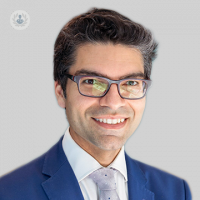How to prepare for weight loss surgery: top tips
Written in association with:When you’re going in for surgery, there is always a lot to think about. For bariatric surgery, or weight loss surgery, this is truer than ever, with instructions to follow both before and after the procedure to make sure it is a success. Leading surgeon Mr Ahmed R. Ahmed is here to give his top tips for preparing for weight loss surgery.

What tips can you give to someone preparing for weight loss surgery?
For somebody preparing for weight loss surgery, my top tips would be:
- Spend time researching the different types of operations, so that when you see the specialist, you can have a more informed discussion.
- Make sure to take in a low-carbohydrate diet in the weeks running up to surgery. This will help the surgeon with the operation.
- Engage in some form of physical exercise in the weeks or months leading up to surgery, even if it’s just going on a 30-minute brisk walk on a daily basis.
- Stop smoking or reduce the amount of cigarettes you smoke.
- Engage with the bariatric team completely and make sure that all your questions are answered and that you are absolutely content and happy about all aspects of the operation and post-operative care.
- Ask the team about the follow-up that’s provided after surgery and attend all follow-up appointments.
Do I have to lose weight before bariatric surgery?
It depends on each bariatric surgeon’s preference. Some surgeons will insist that patients lose weight before the operation; for others, it is not of any significance. However, most surgeons will ask you to follow a low-carb diet for a week or more before the procedure.

Why do I have to follow a diet before the surgery?
The primary reason for following a low-carb diet before surgery is because this reduces the size of the liver. A smaller-sized liver makes the operation easier for the surgeon. The reason your liver gets smaller on a low-carb diet, even if it is just for one week, is because the glycogen or starch storage of your liver gets used up. Some studies have shown that liver size can reduce by up to 1/3 by following such a low-carb diet when followed for two weeks.
The second reason surgeons recommend a diet before an operation is to check a patient’s compliance with instructions. By this, I mean if a patient is put on a pre-op diet and their weight increases, then this calls into question if they really followed the diet, and raises further questions about whether they would comply with the post-operative programme.
What should I take to the hospital with me?
Each unit will have their own advice on this, but really, the essentials are:
- Toiletries
- Fresh clothes
- A book or tablet to keep yourself occupied and prevent boredom, as there may be some waiting.
My other advice would be to check with your surgeon how much time he wants you to stay off food and drink before the surgery. Most patients are told to eat no food from six hours before the operation, and no drink for two hours.
What should be expected on the day of the surgery?
On the day of surgery, you’ll be taken to your room. There will be pre-operative checks, you’ll be seen by your surgeon and anaesthetist, and then taken for surgery.
How much time will I need off work?
Usually no more than a week – keyhole surgery means very little post-operative pain for most people. The majority of patients are back on their feet within a week.
Visit Mr Ahmed’s Top Doctors profile to book a consultation.


